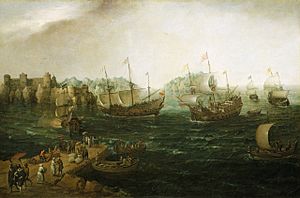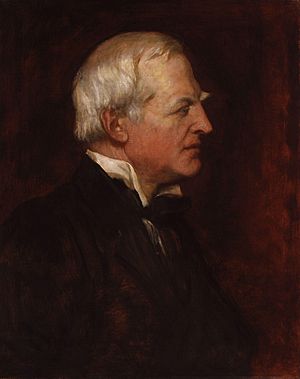History of company law in the United Kingdom facts for kids

The history of company law in the United Kingdom is all about how rules for businesses have changed over time. These rules, called "company law," help control how companies are set up and how they work. While modern company law mostly started in the mid-1800s, different ways of doing business together existed much earlier.
Contents
Early Ways of Doing Business
In medieval times, traders often worked together in groups called "partnerships." These were simple agreements where people shared profits. Early groups like guilds and livery companies also helped organize and regulate trade among their members. They were like early versions of business associations.
The South Sea Bubble
What Was the South Sea Company?
A famous company called the South Sea Company was created in 1711. Its goal was to trade with Spanish colonies in South America. The company got special trading rights after a war ended in 1713. These rights allowed the UK to supply slaves and trade other goods in the region for 30 years.
At first, trading was slow. But people in the UK were excited by big promises of profit from the company's promoters. They bought thousands of shares. By 1717, the South Sea Company became very rich. It even took over the UK government's public debt. This made the company's share price go up even faster.
A law called the Bubble Act 1720 also helped. It stopped other companies from forming without a special Royal Charter. This might have been to protect the South Sea Company from competition. The share price rose so quickly that people bought shares just to sell them for more money.
The Bubble Bursts
This was the first "speculative bubble" in the country. A speculative bubble happens when prices go up very fast, not because things are worth more, but because people expect them to keep rising. But by the end of 1720, the bubble "burst." The share price crashed from £1000 to less than £100. Many people went bankrupt. There was a lot of anger towards companies and their leaders.
Rules Against New Companies
The Bubble Act of 1720 made it very hard to start new companies. This law stayed in place until 1824. Even a famous thinker named Adam Smith wrote in his book The Wealth of Nations (1776) that large companies might not be as good as private businesses. He thought that people managing other people's money might not be as careful as they would be with their own.
He said that managers of big companies might not pay attention to small details. This could lead to carelessness and waste. Because of this, he believed that big companies for foreign trade often struggled against private traders.
Companies and Empires
In the 18th and 19th centuries, many companies were formed to help with colonialism. These companies often had special rights to trade and govern in different parts of the world. They played a big role in expanding the British Empire. Some examples include:
- The African Company of Merchants (started 1752)
- The Sierra Leone Company (started 1792)
- The New Zealand Company (started 1839)
- The British South Africa Company (started 1889)
Modern Company Law Begins

By the 1820s, the Industrial Revolution was booming. This meant there was a big need for new laws to make it easier to do business. Slowly, rules were changed. By 1844, with the Joint Stock Companies Act 1844, it became much simpler to start a company just by registering it.
What is a Separate Legal Person?
One big advantage of forming a company was that it became a "separate legal person." This means the company is seen as its own entity, separate from the people who own or run it. This made it easier to manage all the rights and duties of investors and managers.
Limited Liability: A Big Change
The most important change came with the Limited Liability Act 1855. This law allowed investors to "limit their liability." This means if a business failed, investors would only lose the money they had put into the company. They would not be responsible for any more debts.
These two ideas – easy registration and limited liability – were put together in the first modern company law, the Joint Stock Companies Act 1856. Many Companies Acts have followed since then, including the Companies Act 2006. They all keep these same basic features.
Companies in the 20th Century
Over the 20th century, companies became the main way economic activity happened in the UK. This led to questions about how accountable company leaders were to the people who invested in them.
After the Great Depression, reforms in the Companies Act 1948 made sure that shareholders could remove directors with a simple majority vote. This gave investors more power.
Rules for Big Companies
In the 1990s, there was a focus on how companies were governed internally. This included rules about auditing (checking financial records), separating the roles of chief executive and chairman, and committees to control how much top executives were paid. These rules, found in the UK Corporate Governance Code, apply to companies listed on the stock exchange. They are also supported by principles for how large investors should act in company affairs.
European Influence
The UK's involvement in the European Union also meant that more and more EU rules and court decisions helped to make company law similar across Europe. This helped create a more unified market.
Images for kids
 | Roy Wilkins |
 | John Lewis |
 | Linda Carol Brown |


